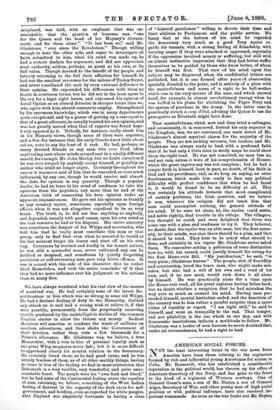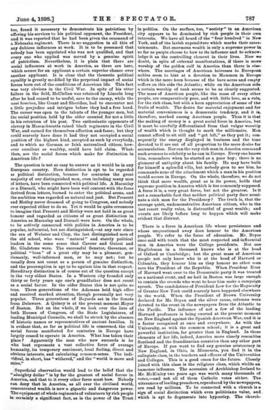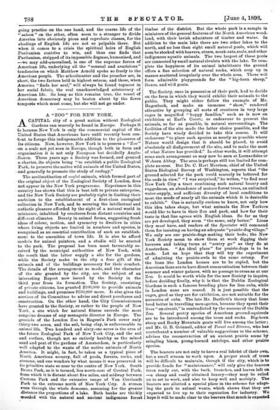AMERICAN SOCIAL FORCES.
NOT the least interesting items in the war news from America have been those relating to the regiments formed by rich and influential young Americans for action in Cuba. Mr. Roosevelt, who has established a considerable reputation in the political world, has thrown up his office of Assistant-Secretary of the Navy, and has gone to the front at the head of a regiment of Western cowboys. One of General Grant's sons, a son of Mr. Blaine, a son of General Alger, Secretary of War, and other young men of high social position or with political influence, have also received im- portant commands. As soon as the war broke out Mr. Bryan.
too, found it necessary to demonstrate his patriotism by offering his services to his political opponent, the President, and it was reported that he had been given the command of a Nebraska regiment. There is no suggestion in all this of any dubious influences at work. It is to be presumed that nobody has been appointed who was not qualified, and that every one who applied was moved by a genuine spirit of patriotism. Nevertheless, it is plain that there are social influences at work in America, as there are here, which secure for an applicant a certain superior chance over another applicant. It is clear that the theoretic political equality is greatly modified by the perpetual impact of social forces born out of the conditions of American life. This fact was very obvious in the Civil War. In spite of his utter failure in the field, McClellan was retained by Lincoln long after he had ceased to be useful, save to the enemy, while the novi homines, like Grant and Sheridan, had to encounter not a little prejudice and intrigue before they had a free hand. The career was open to the talents of the younger men, but the social position held by the older counted for not a little in his retention of his post. Two enthusiastic opponents of slavery in Massachusetts raised black regiments in the Civil War, and earned for themselves affection an& fame; but they could scarcely have done it had they not occupied a social position of the highest kind, accepted as such by everybody, and to which no German or Irish naturalised citizen, how- ever excellent or wealthy, could have laid claim. What, then, are the social forces which make for distinction in American life ?
The question is not so easy to answer as it would be in any European country. Here distinction is apt to be regarded as political distinction, because for centuries the great majority of our distinguished men, even including many men of letters, have been connected with political life. A Macaulay or a Disraeli, who might have been well content with the fame derived from letters, burned to enter the political arena, and the ambition was regarded as natural and just. But Prescott and Motley never dreamed of going to Congress, and nobody ever expected either to do so. Yet it would be quite erroneous to imagine that Prescott and Motley were not held in as great honour and regarded as citizens of as great distinction in America as Macaulay and Disraeli were here. On the whole, to be actively connected with politics in America is to be popular, influential, but not distinguished,—at any rate since the era of Webster and Clay, the last distinguished men of the old school, who were "natural" and stately political leaders in the same sense that Cavonr and Guizot and Mr. Gladstone were. The successful Senator, Governor, or political " boss " of a great city may be a pleasant, gen- tlemanly, well-informed man, or he may not ; but he usually does not count as a person of genuine distinction, and the presumption is apt to be against him in that respect. Hereditary distinction is of course out of the question except in the very oldest States. In a Western city founded only thirty or forty years ago one's grandfather does not count as a social factor. In the older States this is not quite so true. Three generations of the Adamses held high office and received marked attention, though personally not very popular. Three generations of Bayarde sat in the Senate from Delaware. A Quincy is at the present moment Mayor of Boston. But on the whole, if we look over the lists of both Houses of Congress, of the State Legislatures, of leading Municipal Councils, we shall be struck by the absence of historic names or representatives of ancient families. It is evident that, so far as political life is concerned, the old social forces manifested for centuries in Europe have largely ceased to operate in America. What has taken their place ? Apparently the man who now succeeds is he who best represents a vast collective force of average humanity, its temporary sentiment, local feeling, direct and obvious interests, and calculating common-sense. The indi- vidual, in short, has "withered," and the "world is more and more."
Superficial observation would lead to the belief that the "almighty dollar" is by far the greatest of social forces in America, and that to it every other force must bow. Nobody can deny that in America, as all over the civilised world, concentrated wealth is now a gigantic and dangerous power. The equipment of whole regiments of volunteers by rich people 18 cer tainly a significant fact, as is the power of the Trust
in politics. On the surface, too, "society" in an American city appears to be dominated by rich people in their own interests. We have all heard of the "four hundred" in New York, and of the lavish expenditure which marks their enter- tainments. But enormous wealth is only a supreme power in so far as people choose to bow to its influence and to acknow- ledge it as the controlling element in their lives. Now we doubt, in spite of external manifestations, if there is more worship of the golden calf in America than there is else- where. The marriages of American heiresses to European nobles seem to hint at a devotion to Mammon in Europe which is the more keen because of the bare acres and empty coffers on this side the Atlantic ; while on the American side a certain worship of rank seems to be as clearly suggested. The mass of American people, like the mass of every other people, are comparatively poor, and with little love, as a rule, for the rich class, but with a keen appreciation of some of the fruits of wealth. The desire for material enjoyment and for material conveniences is a democratic tendency, and it is, therefore, marked among American people. Thus it is that the making of money is a great social force in America, but it must be carefully differentiated from that vulgar worship of wealth which is thought to mark the millionaire. Men cannot afford to sit still and "get left," as they put it; con. sequently the energy displayed in business and the time devoted to it are out of all proportion to the mere desire for accumulation. Nor can the very rich man in America command such avenues to celebrity as he can in Europe. Every one knows him, remembers when he started as a poor boy ; there is no glamour of antiquity about his family. He may have built for himself a splendid villa, but nobody goes to see him, he commands none of the attachment which a man in his position would secure in Europe. On the whole, therefore, we do not think that mere wealth, great as is its power, holds that supreme position in America which is too commonly supposed. A force it is, a very great force, but not the greatest. Is it not a remarkable fact that neither political party dare nomi- nate a rich man for the Presidency P The truth is, that the average quiet, undemonstrative American citizen, who in the last resort really rules, is distrustful of great wealth ; and events are likely before long to happen which will make evident that distrust.
There is a force in American life whose persistence and whose unquestioned sway does honour to the American people. We refer to the force of education. Mr. Bryce once said with truth that the most respected and influential men in America were the College presidents. Not one Englishman in a thousand knows who is at the head of Oxford or Cambridge ; but the great mass of American people not only know who is at the head of Harvard or Columbia, they honour him as they honour no other man save the President of the Republic. When President Eliot of Harvard went over to the Democratic party it was treated as a national event, and no hall in Boston was large enough to contain the crowds who went to bear him make a campaign speech. The candidature of President Low for the Mayoralty of Greater New York could scarcely have happened elsewhere in the world. When the President of Brown University declared for Mr. Bryan and the silver cause, columns were devoted to the event in the newspapers from the Atlantic to the Pacific. The influence of not a few of the leading Harvard professors is being exerted at the present moment on New England against the Spanish-American War, and it is a factor recognised at once and everywhere. As with the University, so with the common school; it is a great and powerful institution, far greater than in England. In these elements of her life, indeed, America more closely resembles Scotland and the Scandinavian countries than any other part of Europe. If you want to find any genuine aristocracy in New England, in Ohio, in Minnesota, you find it in the collegiate class, in the teachers and officers of the Universities and Colleges. This is a good omen for the future. Closely joined with this class is the religious class, which wields an immense influence. The accession of Archbishop Ireland to Mr. McKinley two years ago was worth many thousands of votes,—and not all of them Catholic votes either. The utterances of leading preachers, reproduced by the newspapers, are read by millions. To be connected with a church is a sign of social distinction which even politicians value, and which is apt to degenerate into hypocrisy. The church-
going practice on the one hand, and the coarse life of the " saloon " on the other, often seem to a stranger to divide America into obviously pious and reprobate classes, for the shadings of English life are not so palpable there. But when it comes to a crisis the spiritual heirs of English Puritanism contrive to win, and thus one finds that Puritanism, stripped of its impossible dogmas, humanised, and —we may add-5-moralised, is one of the supreme forces of American life, underlying all the "sensual and avaricious" tendencies on which Matthew Arnold spoke so freely to the American people. The schoolmaster and the preacher are, in short, the two factors held in highest esteem, and these, when America "finds her soul," will always be found topmost in bier social fabric, the real unacknowledged aristocracy of American life. So long as this remains true, the vessel of American democracy may be beaten about by the fierce tempests which must come, but she will not go under.




































 Previous page
Previous page